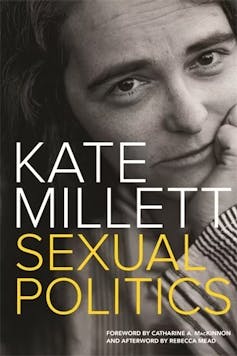Kate Millett pioneered the term ‘sexual politics’ and explained the links between sex and power. Her book changed my life
- Written by Barbara Caine, Professor of History, University of Sydney

I still think of Kate Millett’s Sexual Politics as the book that changed my life. Its insistence on the importance of patriarchal structures and sexual hierarchies in literature and history, as well as in contemporary society, was eye-opening.
The 1970s saw the publication of several classic feminist texts, including Shulamith Firestone’s The Dialectic of Sex, Eva Figes’ Patriarchal Attitudes and Germaine Greer’s The Female Eunuch. For the most part, these books grew out of the discussions and consciousness-raising groups associated with the early stages of the Women’s Liberation movement.
Many women who became feminists in the 1970s still ask which of these books was most important to them. For me, the answer is unquestionably Sexual Politics.





